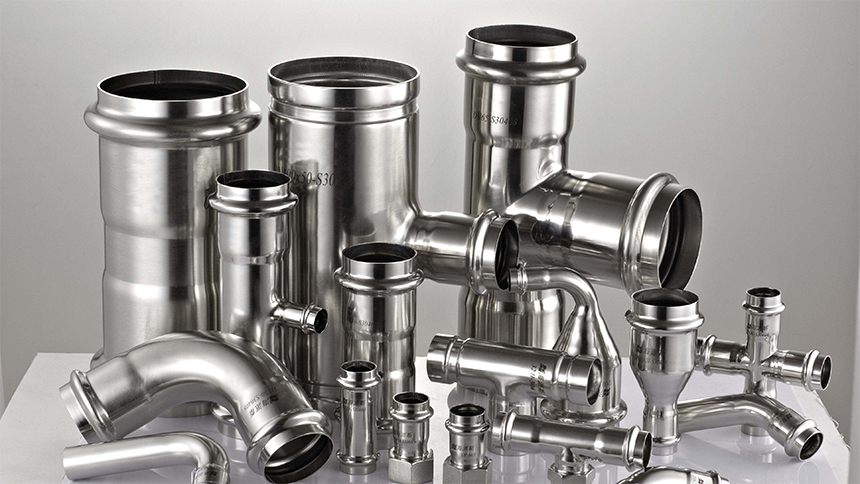SUS304 Stainless Steel Introduction
SUS304 material is a Japanese JIS standard and the most commonly used stainless steel, containing 18% Cr and 8% Ni. It can maintain good strength and heat resistance in high temperature and low temperature environments, and also has good corrosion resistance, weldability, cold workability and mechanical properties in the mild atmosphere.
Material SUS304 Meaning
SUS is the first letter of “Steel Use Stainless” written in English. The stainless steel number consists of three digits, the 300 series is austenitic stainless steel, and the 400 series is ferritic or martensitic stainless steel.
Datasheet & Specification
The following are the datasheets of SUS304 chemical composition and properties, such as melting point, density, tensile strength, elongation, modulus of elasticity, specific heat, coefficient of thermal expansion, thermal conductivity, electrical resistivity, magnetic properties and so on.
SUS304 Stainless Steel Chemical Composition
The composition of SUS304 grade stainless steel is given in table 1.
Table-1, SUS304 stainless steel composition
| Chemical Composition % | |||||||||
| Country (Region) | Standard | Steel Grade | C ≤ | Si ≤ | Mn ≤ | P ≤ | S ≤ | Cr | Ni |
| Japan | JIS G4303 | SUS304 | 0.08 | 1.00 | 2.00 | 0.045 | 0.030 | 18.00-20.00 | 8.00-10.50 |
SUS 304 Mechanical Properties
The following table shows the SUS 304 yield strength, tensile strength, elongation and hardness.
Table-2, SUS 304 mechanical properties
| Mechanical properties | ||||||||
| Country (Region) | Standard | Steel Grade | Diameter (d) in mm | Yield strength (N/mm2) | Tensile strength (N/mm2) | Elongation (%) | Hardness (HB) | Hardness (HV) |
| Japan | JIS G4303 | SUS304 | d≤180 | ≥ 205 | ≥ 520 | 40 | ≤ 187 | ≤ 200 |
Physical Properties
Table-3, SUS 304 material physical properties
| SUS304 Material Physical Properties | |
| Density (g/cm3) | 7.93 |
| Melting point (℃) | 1,400-1,450 |
| Specific heat (J/kg·℃) | 460-502 |
| Electrical resistivity (μΩ·m) (20℃) | 0.73 |
| Thermal expansion (10-6/K) | 16.3 (20-100℃) |
| 17.8 (20-300℃) | |
| 18.4 (20-500℃) | |
| Thermal conductivity (W/m·K) | 16.8 (100℃) |
Magnetic
Material SUS304 is not magnetic, but it may be slightly magnetic due to cold working.
Corrosion resistance
The reason why SUS 304 stainless steel has excellent corrosion resistance in the atmosphere is due to the formation of a chromium passivation film on its surface. But when SUS 304 is in a warm chloride environment, the corrosion is even faster than non-alloyed mild steel.
Heat Treatment
SUS304 stainless steel solution heat treatment is from 1010℃ to 1150℃ in rapid cooling method.
Welding
SUS 304 stainless steel has good weldability and can be welded by the usual welding method without heat treatment before welding.
However, the welding of SUS 304 material are also insufficient: after welding large steel parts, it is sensitive to intergranular corrosion in chlorine-containing medium. In this case, SUS304L with lower carbon content should be selected.
Applications
SUS304 stainless steel is widely used in medical fields (such as surgical instruments, test instruments), food fields (such as kitchen utensils and tableware), architectural decoration and artwork (such as metal curtains, punching nets, metal facades), and electronic products (such as cell phones and Laptop case, kettle), daily necessities (such as scissors, water cups, etc.)
Equivalent Grade
JIS SUS304 material equivalent to ASTM AISI, European EN (Germany DIN EN, British BSI, French NF…), ISO and Chinese GB standard.
| SUS304 material equivalent | |||||||||
| Japan | USA | European Union | ISO | China | |||||
| Standard | Grade | Standard | Grade (UNS) | Standard | Steel Name (Steel Number) | Standard | Grade | Standard | Grade |
| JIS G4304 | SUS304 | AISI; ASTM A240/A240M; A276/A276M | AISI 304 (S30400) | EN 10088-3; EN 10088-1 | X5CrNi18-10 (1.4301) | ISO 15510 | X5CrNi18-10 | GB/T 20878; GB/T 1220; GB/T 3280 | 06Cr19Ni10; 0Cr18Ni9 (Old designation) |

